
Atlas F1 GP Correspondent
Can you imagine a Lauda, a Rosberg, and a Piquet racing against each other in Formula One in a not so distant future? That seems more likely each day, as the sons of the former World Champions successfully continue to climb up the motor racing ladder on their way to the sport where their fathers became heroes. Atlas F1's Will Gray reviews the careers of the next generation of famous racing names
Rosberg and Piquet, whose fathers vied for World Championship glory with Lauda's father Niki in the 1980s, finally met at the Marlboro Masters, at Zandvoort, when the European Formula Three Championship in which Rosberg races merged with the British Championship where Piquet competes for a flagship event.
The historic meeting ended, disappointingly, with Rosberg, heavily struck down by a cold and flu virus, forced to pull out after struggling in the opening sessions while Piquet blew the field away in qualifying and eventually finished second. But their brief encounter was enough to point to the future.
"It will be great to see them in Formula One and I think it will happen because they are both very good, not because of their names," said a proud Keke Rosberg, who won his Formula One World Championship in 1982, one year after Piquet took the first of his three world titles.
"They are both in their first Formula Three season, they have both won races already and I think for their age it is quite remarkable. They are racing against guys who are much more experience than them and much older so I think they have what it takes."
Briton Damon Hill became the first second-generation driver to follow in the footsteps of his father, two-time World Champion Graham, when he won the world drivers' title with Williams in 1996. It put the Hill name in the record books as the only father-son combination to lift the crown.
Hill, however, was forced to achieve his goal without the help of his father after 1962 and 1968 champion Graham died in an aeroplane crash at Elstree in London late in November 1975, when Damon was only 15 years old and was more into bikes than cars.
Strangely, Hill and Villeneuve seem to have been the only sons from their respective father's generations to take racing seriously and rise through the ranks to the pinnacle of Formula One, and both did it without the help or influence of their respective fathers.
Now there is a host of drivers making a name for themselves using a name from the past. All three - Rosberg, Piquet and Lauda - are currently at the Formula Three level, effectively two categories away from Formula One, and all three have the benefit of their fathers' experience to draw upon. Not that any of them seem to be willing to give it.
"Whether he gets to the top depends how he performs. I do not get involved at all," said Niki Lauda.
"I have not really helped him that much because at the end of the day it is really just something that he has to do," added Keke Rosberg. "He does not influence me much," Nelsinho Piquet concurred of his father.
The fact they have the name, however, is certain to have an effect on their careers - this feature would not be written, for example, if they were just 'ordinary' drivers making their way up the ladder. It's just the way the world works.
Ralf Schumacher, for instance, would probably not have had such an easy ride into Formula One if Eddie Jordan, who gave him his Grand Prix debut in 1997, had not had the bitter memories of losing his grip on Schumacher's elder brother Michael in 1991 after bringing him into Formula One.
Both Rosberg and Piquet now run the Formula Three teams their sons drive for in their respective series but both keep out of their careers as much as they can. Piquet, who also runs a satellite communications firm in his native Brazil, only visits England once a month to see his son but he is no less passionate than his former rival Rosberg.
"I will only come over to watch him once a month but when I do I can advise him on things," said Piquet. "I can tell him to 'slow down', take a look at things. If you know how to prepare cars and set them up then you can do it. He had a tough time early on but when he got it, he turned to me and said 'father, OK, you were right.'"
Piquet, who is currently running strongly in the British Formula Three Championship, backed up his father's comments by adding: "He doesn't do anything like that. He just tells me what to do with my life, he works out where I am going to go in the future. He is the one who plans all that but he doesn't tell me how to drive on the track."
In contrast to Piquet and Rosberg, Matthias Lauda is not so lucky. Prevented from racing when he was younger by a fearful father who did not want his son putting himself through the same risks he had done in the past, Lauda was held back despite desperately wanting to follow in his father's footsteps.
Lauda, who was the boss of Jaguar Racing until the end of last year and who is still a regular visitor to the Grand Prix paddocks, admits now that maybe he was wrong to hold his son back. But that does not make him any more interested in watching or helping his son's career climb up the ladder.
"My brother, Lucas, is his manager, Superfund is the sponsor, and it works," said a blunt Lauda. "When he asks me something I give him my opinion but I try to stay out of it and leave him alone. I want him to make his own way. He can never be like I was, he can only be himself. It is in the blood, there is no question he has influence, but the more freedom they get to be themselves, then I think the quicker it is that they get to Formula One. They develop quicker without influence.
Rosberg takes a different view, admitting that Nico was forced to grow up amongst "petrol heads" and had little opportunity to avoid pursuing a career on the track. Rosberg used to let him loose on his own kart track and, unlike some famous fathers, has always provided a backbone of support.
"I have had a good time in my life in motor racing so I was happy for him to do it," said Rosberg. "Of course you are worried, you are always worried as a parent when your kid is doing something else than knitting, you know, but that is the down side of motor racing and it is something you have to accept. You just have to decide very early whether you are going to put up with it or not.
"I don't think he had much of a choice because all people around me are some kind of petrol heads, so motor racing has always been in the air. Actually, what happened is we have a nice kart track near Monaco and all the other kids were going there so one day he wanted to go too."
Keke jokes now that Nico was "nearly" born in a kart and admits that, owning a kart track built near their home in Ibiza well before his youngster came into the world, it was inevitable that he would start racing very early in his life. But Keke did not push him into it - he didn't have to.
"He ran at the track occasionally but it was more like children do - he wasn't hooked on it, but he quite enjoyed doing it. He started seriously around nine or nine-and-a-half years old but at that age you don't decide you want to be in Formula One - it doesn't happen like that.
Rosberg stopped racing in 1986, one year after handing his seat at Williams to old rival Piquet, but won his final Grand Prix one year earlier at the United States East and Australian races. And he still remembers the intense rivalry he enjoyed with his eventual replacement.
"We raced ten years in Formula One together so I suppose we know each other a little bit," Rosberg said. "But we have never been best mates going out or anything. Actually, we were rivals. He was driving for Brabham, I was driving for Williams at that time.
"I suppose he is still grateful to me that I jumped Williams and went to McLaren so he could get a drive otherwise he would never have driven in '86! I am sure he is grateful to me - it raised his salary too!"
The two boys, however, were too young to remember their fathers racing in Formula One and Nico first saw Keke race in the German DTM Touring Car Masters series well after the Finn had finished the successful 114-race Grand Prix career in which he won five races and one world title.
"He saw me racing in DTM but he never saw me racing in Formula One," said Rosberg senior. "He has seen the tapes, but only recently. I don't think he was interested before and after he has seen the videos I think he has lost interest again!
"I don't know if it is in blood or not but I certainly think he and Nelsinho seem to have what it takes. If you have a kid who is ambitious - my kid could be as ambitious about his university career as he could about his racing, it just happens that it swung one way. It could have swung the other way.
"I don't think Nico has the pressure of my name anymore, he has got his own pressure now and I think he is going to look at it one more year and then he is going to make a decision if he goes the university route or the racing route or what is going to happen. In that time he should be better qualified to make that decision."
Schooled in the same Monaco classroom and old rivals from the playing fields of the Cote d'Azur, the sons of former World Champions Keke Rosberg and Nelson Piquet finally met on the track as seasoned racing drivers in the Netherlands last weekend and begin talk of the arrival of Formula One's 'Next Generation'.
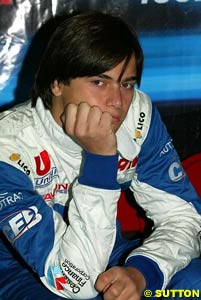 The duo, Nico Rosberg and Nelsinho Piquet, both 18, have gradually worked their way up the motorsport ladder helped, or hindered, by the names of their famous fathers with another 'son of', Matthias Lauda, closely following to add another famous name to the growing list of racing sons.
The duo, Nico Rosberg and Nelsinho Piquet, both 18, have gradually worked their way up the motorsport ladder helped, or hindered, by the names of their famous fathers with another 'son of', Matthias Lauda, closely following to add another famous name to the growing list of racing sons.
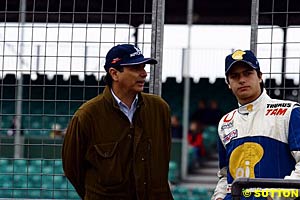 Jacques Villeneuve, the son of Ferrari legend Gilles, followed Hill to become the second next generation driver in the record books, taking his title one year after Hill, in 1997, and achieving a feat his father, sadly, was prevented from doing because of his premature death in an accident in 1982.
Jacques Villeneuve, the son of Ferrari legend Gilles, followed Hill to become the second next generation driver in the record books, taking his title one year after Hill, in 1997, and achieving a feat his father, sadly, was prevented from doing because of his premature death in an accident in 1982.
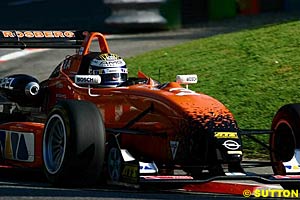 Hill, too, and Villeneuve, also benefited from their names, but they are different to the current crop of racing sons, whose biggest help does not, apparently, come from their name but rather from the small hints that their fathers reluctantly hand them - and from the large sums of money that they can also provide.
Hill, too, and Villeneuve, also benefited from their names, but they are different to the current crop of racing sons, whose biggest help does not, apparently, come from their name but rather from the small hints that their fathers reluctantly hand them - and from the large sums of money that they can also provide.
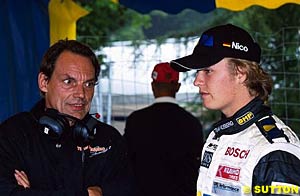 "He is good, there is no question about that. The speed is there and he performs but he has very little experience because I never let him race until he finished his school - so he has to make up a lot of time. The other guys started earlier."
"He is good, there is no question about that. The speed is there and he performs but he has very little experience because I never let him race until he finished his school - so he has to make up a lot of time. The other guys started earlier."
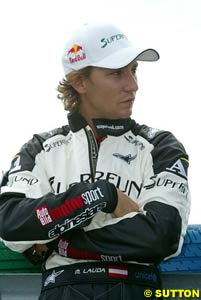 "People forget that those kids, Nelsinho and Nico, started school on the same day and sat next to each other in the classroom, so for them the Masters was not as special as everyone else imagined. They have met each other in karting before - it was a World Championship in Portugal or something and Nelson wasn't there."
"People forget that those kids, Nelsinho and Nico, started school on the same day and sat next to each other in the classroom, so for them the Masters was not as special as everyone else imagined. They have met each other in karting before - it was a World Championship in Portugal or something and Nelson wasn't there."
Please Contact Us for permission to republish this or any other material from Atlas F1.
|
Volume 9, Issue 33
Articles
The Next Generation
Forgotten in the Forest
Columns
Rear View Mirror
On the Road
Elsewhere in Racing
The Weekly Grapevine
> Homepage |